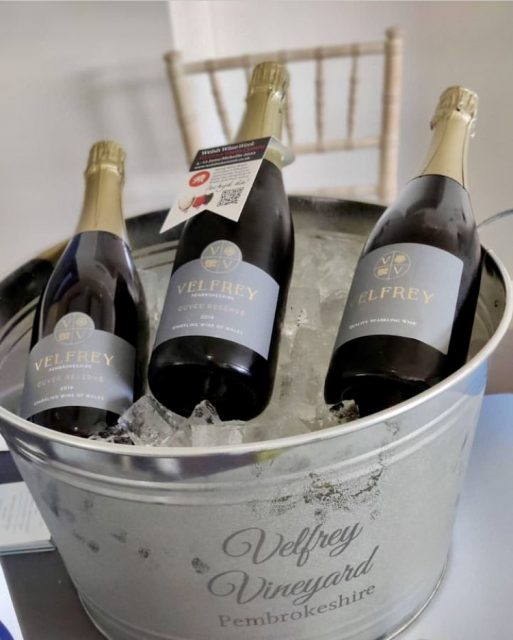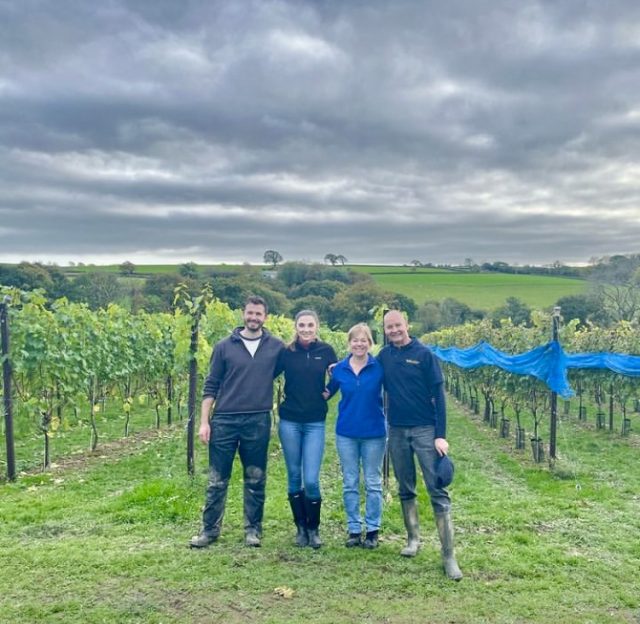This website uses cookies so that we can provide you with the best user experience possible. Cookie information is stored in your browser and performs functions such as recognising you when you return to our website and helping our team to understand which sections of the website you find most interesting and useful.
Welsh winery gets protected status for its sparkling wines
Velfrey Vineyard has been awarded a Protected Geographical Indication (PGI) for its sparkling Bruts. db discovers what makes Pembrokeshire fizz so unique.

The clay loam soils of Velfrey Vineyard are planted with Pinot Noir, Seyval Blanc and Solaris, which the Welsh producer uses to make its award-winning sparkling wines.
Two of these wines have now been awarded a Protected Geographical Indication (PGI) to safeguard them against imitation and misuse. The PGI status, declared last week, signals to consumers a clear link between a product and a specific region, which benefits the product’s quality or flavour.
The protected wines are: Velfrey NV Traditional Method Sparkling Brut and Rhosyn 2021 Traditional Method Vintage Sparkling Brut Rosé.
Retailing at £35 and £42 respectively, the wines’ top-tier pricing reflects their small production, with 5,000 to 10,000 bottles of Velfrey NV made each year and just 1,140 bottles of Rhosyn.
Lesley Griffiths, Rural Affairs Minister for North Wales and Trefnydd, said: “The Welsh wine industry is thriving and Velfrey Vineyard is an important part of this success.”
The drinks business caught up with Velfrey owner Andy Mounsey about what makes Pembrokeshire wines so unique.
“Pembrokeshire’s geology and climate are special, which is why we have so many field trips from university geology departments, as well as holidaymakers visiting the county,” he tells db.
“Our vineyard soils are a sandy, clay loam, and the climate is influenced by the proximity to the coast providing a long, warm ripening period perfect for cool-climate wine.”
According to Mounsey the location comes with its challenges “which means that careful selection of varieties and rootstock is essential alongside really considered management of the canopy and use of natural products like seaweed and tisanes to keep the leaves healthy,” he says.
“But if you get it right, there is some kind of alchemy, which leads to a real ‘wow factor’ when people first taste the wines.”
Mounsey says he hopes the PGI will bring Welsh wine another step closer to getting the global recognition it deserves.
“Wales produces wines of fantastic quality, some of which have won the highest accolades in prestigious international competitions. It is delicious but also diverse, with everything from still reds, whites and rosés, to sparkling whites and rosés, to dessert wines and fortified wines found right across the country.”
“Even so, we still have local people visiting the vineyard who say ‘I never knew you could produce wine in Wales!’”

Velfrey won a Master medal in db‘s inaugural English and Welsh Wine Masters competition in 2022 for its NV Traditional Method Sparkling, with the judges saying that “this exceptional wine demands to be paired with the best seafood available on the Welsh coast.”
“A very dry, Brut-style, the wine is concentrated, mid-weight with crunchy fruit and intricate yeasty flavours balanced by vibrant acidity,” said Patricia Stefanowicz MW, who was on the judging panel for the competition.
“Mid-lemon in colour, with tiny persistent bubbles, the wine shows aromatic yellow plum, white peach and green pear fruit with croissant-brioche accents.”
As for the Rhosyn Traditional Method Vintage Sparkling, it might be pink, says Andy Mounsey, but it’s “a serious wine”.
“Rhosyn gains its delicate blush colour and red fruit character from skin contact with the Pinot Noir grapes,” he says. ” It has a lively pour making it perfect for celebrations, but this is a serious wine, not a frivolous rosé.”
“On the nose it has notes of warm bread with tangerine peel and fresh strawberries. On the palate, wild strawberries and citrus with a touch of peach flesh from close to the stone.”
Velfrey also produces a still dry white wine from Solaris grapes which Mounsey says is “reminiscent of Sauvignon Blanc from the Loire Valley” and a natural wine, which is slowly fermented with wild yeasts in old oak barrels with lees stirring and natural malolactic “to produce a clean, crisp white with green orchard fruit character, subtle smoke and a buttery finish.”

Laverbread
Velfrey Vineyards is not the only Welsh company to have received a PGI recently. The Pembrokeshire Beach House Company also won protected status for its traditional laverbread, made from cooked Welsh laver (seaweed).
To make laverbread, sometimes referred to as “Welshman’s caviar”, seaweed is boiled for several hours, then pureed or minced. Many people like to coat it with oatmeal before frying it, and slathering on hot buttered toast alongside eggs and bacon, or served with shellfish. The laver is known for being collected on the beaches of Pembrokeshire in North Wales.
“Laverbread is an important part of Pembrokeshire food history and we are absolutely delighted to receive this status. We currently use laverbread in our seaweed butter, Lobster Welsh Rarebit and even in our Welsh cakes,” said Jonathan Williams, owner of The Pembrokeshire Beach House Company.
Related news
A 'challenging yet surprising' vintage for Centre-Loire in 2024

